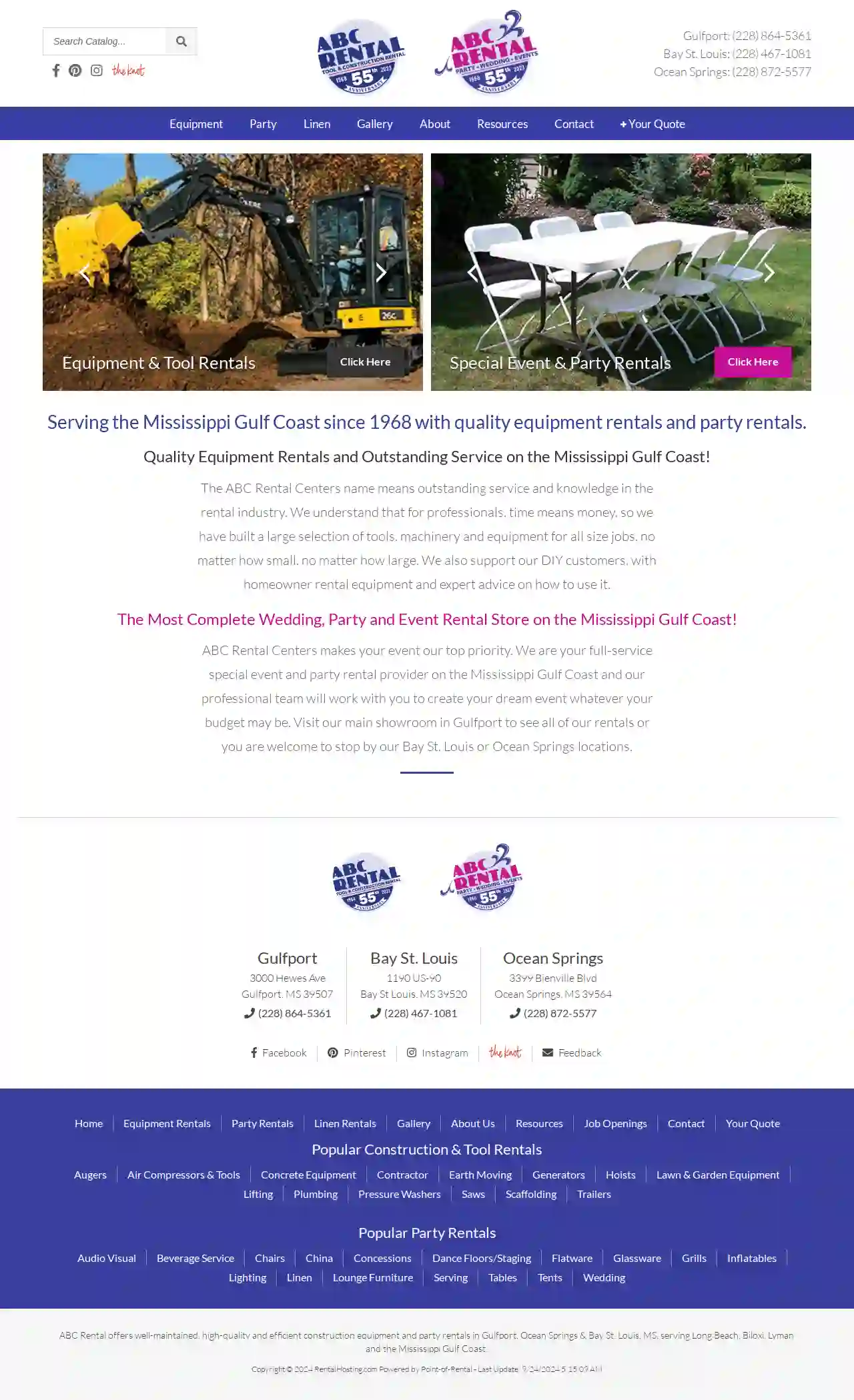Scaffolding Companies Flowood
Top 10 Scaffolding Specialists in Flowood
Get up to 3 Scaffolding Company quotes for your project today! Compare profiles, reviews, accreditations, portfolio, etc... and choose the best service.
Service Needed
City or Town

ABC Rental Center
4.4151 reviews3000 Hewes Ave, Gulfport, 39507, USABC Rental offers well-maintained, high-quality and efficient construction equipment and party rentals in Gulfport, Ocean Springs & Bay St. Louis, MS, serving Long Beach, Biloxi, Lyman and the Mississippi Gulf Coast. With a wide range of equipment and party rentals, ABC Rental is dedicated to providing outstanding service and knowledge in the rental industry.
- Services
- Why Us?
- Gallery
Get Quote- Ma
Magnolia Masonry of South Mississippi LLC
4.914 reviewsGulfport, US- Services
- Why Us?
Get Quote - Cr
Crom Equipment Rentals Inc
Gulfport, US- Services
- Why Us?
Get Quote - Lo
Lowe's Home Improvement
4.1Gulfport, US- Services
- Why Us?
Get Quote - Th
The Home Depot
4.2Gulfport, US- Services
- Why Us?
Get Quote
Over 2,353+ Scaffolding Contractors in our network
Our scaffolding companies operate in Flowood and surrounding areas!
ScaffoldingHQ has curated and vetted the Best Scaffolding Businesses in and around Flowood. Find the most trustworthy contractor today.
Frequently Asked Questions About Scaffolding Companies
Find answers to common questions about scaffolding companies and hiring scaffolding contractors in the USA.
- Communicate with the Scaffolding Company: Clearly express your concerns about potential damage to landscaping, structures, or utilities.
- Clear the Area: Remove any valuable or fragile items from the work zone.
- Protect Landscaping: Cover plants, shrubs, and lawns with tarps or protective sheeting.
- Mark Underground Utilities: Ensure underground utilities (water lines, electrical cables) are marked and avoided during installation.
- Supervision: If possible, be present during erection and dismantling to monitor the process.
- Traditional and highly versatile.
- Components (tubes, clamps, boards) are assembled on-site.
- Adaptable to complex shapes and structures.
- Requires skilled labor and more time for erection.
- Pre-engineered, modular components.
- Faster and easier to erect.
- Often has higher load capacities.
- May be less versatile for complex shapes.
- Regulations: Local regulations often specify minimum inspection intervals.
- Project Type and Duration: Long-term projects or those in challenging environments may require more frequent inspections.
- Weather Conditions: Severe weather (storms, high winds) can necessitate additional inspections.
- Any Alterations or Modifications: Any changes to the scaffolding structure require re-inspection.
- Tube and Clamp Scaffolding: A traditional and versatile system using individual tubes and clamps. It's highly adaptable but requires more time to erect.
- System Scaffolding: Pre-engineered systems with modular components that fit together quickly. They offer speed and efficiency, especially for larger projects.
- Suspended Scaffolding: Hung from a roof or overhead structure, ideal for high-rise buildings or areas with limited ground access.
- Mobile Scaffolding: Mounted on wheels, allowing easy movement around a worksite. Suitable for tasks like painting or plastering.
- Specialized Scaffolding: Cantilever scaffolding, rolling towers, and other specialized systems cater to specific needs.
How do I protect my property from damage during scaffolding erection and dismantling?
To protect your property:
What is the difference between tube and clamp scaffolding and system scaffolding?
The two main types of scaffolding systems have distinct advantages and disadvantages:
Tube and Clamp Scaffolding:
Tube and Clamp Scaffolding:
How often should scaffolding be inspected?
Regular scaffolding inspections are crucial for maintaining safety. The frequency of inspections depends on factors like:
What are the different types of scaffolding?
Several types of scaffolding are used in construction, each suited for different applications:
How do I protect my property from damage during scaffolding erection and dismantling?
To protect your property:
- Communicate with the Scaffolding Company: Clearly express your concerns about potential damage to landscaping, structures, or utilities.
- Clear the Area: Remove any valuable or fragile items from the work zone.
- Protect Landscaping: Cover plants, shrubs, and lawns with tarps or protective sheeting.
- Mark Underground Utilities: Ensure underground utilities (water lines, electrical cables) are marked and avoided during installation.
- Supervision: If possible, be present during erection and dismantling to monitor the process.
What is the difference between tube and clamp scaffolding and system scaffolding?
The two main types of scaffolding systems have distinct advantages and disadvantages:
Tube and Clamp Scaffolding:
Tube and Clamp Scaffolding:
- Traditional and highly versatile.
- Components (tubes, clamps, boards) are assembled on-site.
- Adaptable to complex shapes and structures.
- Requires skilled labor and more time for erection.
- Pre-engineered, modular components.
- Faster and easier to erect.
- Often has higher load capacities.
- May be less versatile for complex shapes.
How often should scaffolding be inspected?
Regular scaffolding inspections are crucial for maintaining safety. The frequency of inspections depends on factors like:
- Regulations: Local regulations often specify minimum inspection intervals.
- Project Type and Duration: Long-term projects or those in challenging environments may require more frequent inspections.
- Weather Conditions: Severe weather (storms, high winds) can necessitate additional inspections.
- Any Alterations or Modifications: Any changes to the scaffolding structure require re-inspection.
What are the different types of scaffolding?
Several types of scaffolding are used in construction, each suited for different applications:
- Tube and Clamp Scaffolding: A traditional and versatile system using individual tubes and clamps. It's highly adaptable but requires more time to erect.
- System Scaffolding: Pre-engineered systems with modular components that fit together quickly. They offer speed and efficiency, especially for larger projects.
- Suspended Scaffolding: Hung from a roof or overhead structure, ideal for high-rise buildings or areas with limited ground access.
- Mobile Scaffolding: Mounted on wheels, allowing easy movement around a worksite. Suitable for tasks like painting or plastering.
- Specialized Scaffolding: Cantilever scaffolding, rolling towers, and other specialized systems cater to specific needs.